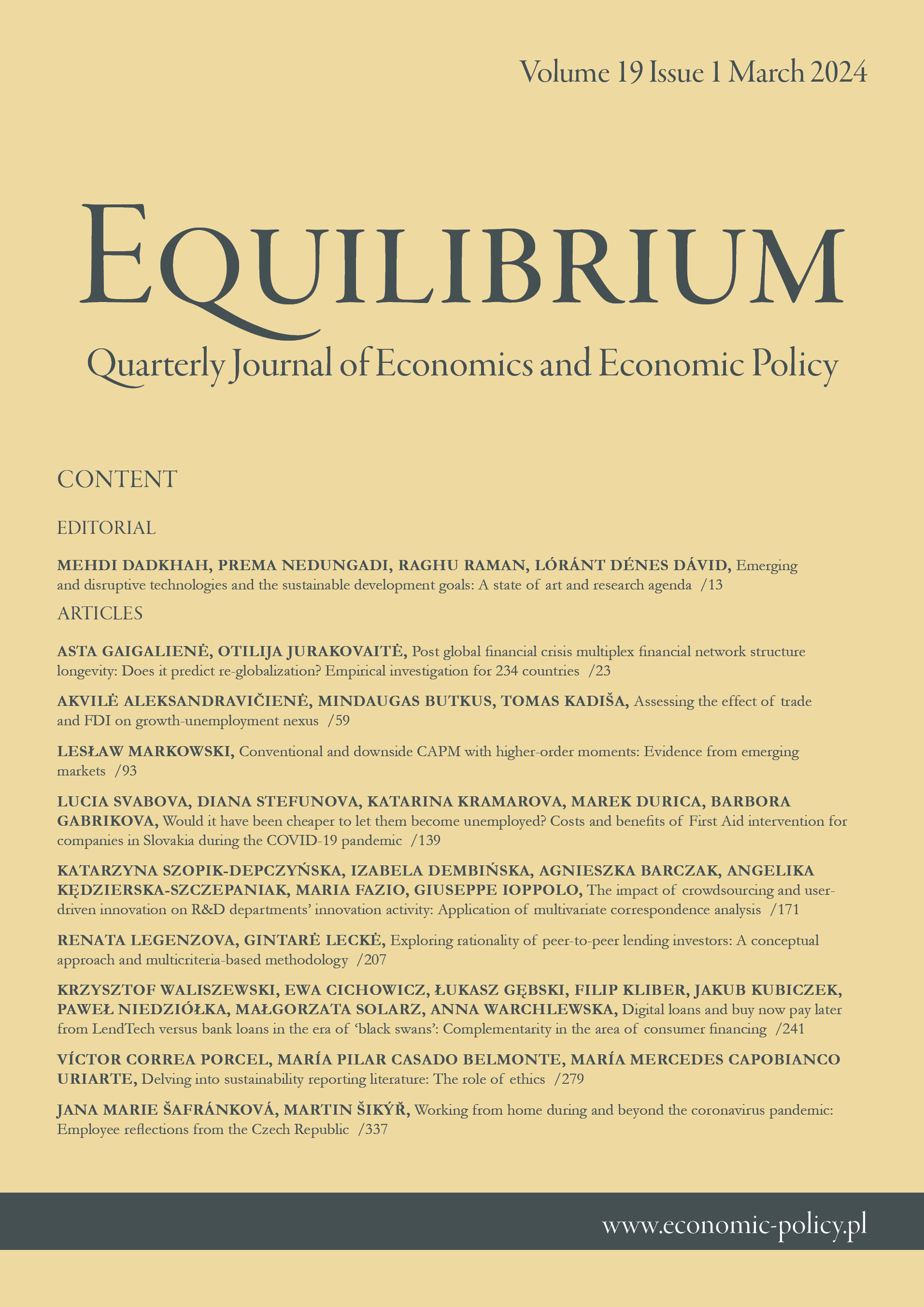独立财政委员会在改善欧洲联盟国家财政业绩方面的作用
IF 6.2
Q1 ECONOMICS
Equilibrium-Quarterly Journal of Economics and Economic Policy
Pub Date : 2019-12-31
DOI:10.24136/eq.2019.029
引用次数: 4
摘要
研究背景:自2008-09年全球金融危机以来,独立财政委员会是新财政机构的一个例子,其数量在世界各地迅速增加,包括欧盟国家。公共财政的进一步恶化引发了许多经济学家对负责促进健全财政政策的财政委员会的最佳形式、职能和有效性的争论。有鉴于此,对活跃在欧洲公共辩论中的独立财政委员会的研究在智力上似乎很有吸引力。文章目的:本文旨在探讨独立财政委员会对财政绩效的影响,特别关注其任务、任务和制度模式,以加强欧盟国家财政纪律的实现。与此相关,财政委员会的有效性问题出现了,尤其是在外部压力下(在欧洲层面)强制设立的机构,在国家议会中没有得到强有力的政治支持的情况下。方法:根据欧盟委员会收集的数据,实施描述性分析和小组数据分析,以显示财政委员会在2006-2017年加强欧盟国家财政纪律方面的作用。调查结果和增值:由于有适当的财政规则支持的精心设计的财政委员会,可以实现财政绩效的改善以及更好的宏观经济和预算预测。所进行的分析证实,独立的财政委员会是对政府收入和支出实行间接社会控制的有用机制。这意味着提高财政透明度,降低政府和选民之间的财政幻想。由于公共财政透明度的提高,有可能减少导致公共债务增长的“党派”赤字偏见。实证研究扩展了关于财政委员会作用及其对财政绩效影响的现有知识。本文章由计算机程序翻译,如有差异,请以英文原文为准。
The role of independent fiscal councils in improving fiscal performance of the European Union countries
Research background: Independent fiscal councils are an example of new fiscal institutions, the number of which has rapidly increased around the world, including the EU countries since the global financial crisis of 2008–09. A further deterioration of public finance has provoked many economists to intensify disputes regarding the optimal shape, functions and effectiveness of fiscal councils responsible for promoting sound fiscal policy. Given this, a research focus on independent fiscal councils, active in the public debate in Europe, seems intellectually attractive. Purpose of the article: This article aims to explore the impact of Independent Fiscal Councils on fiscal performance, paying particular attention to their mandate, tasks and institutional models which can strengthen the achievement of fiscal discipline in the EU countries. In connection with this, the question arises about the effectiveness of fiscal councils, especially in the case of institutions that were compulsorily created under the external pressure (at the European level) and found no strong political support in national parliaments. Methods: Descriptive analysis along with panel data analysis were implemented to show the role of fiscal councils in enhancing fiscal discipline in the EU countries in years 2006–17 on the basis of data collected by the European Commission. Findings & Value added: The improvement in fiscal performance and better macroeconomic and budgetary forecasts can be achieved thanks to well-designed fiscal councils supported by appropriate fiscal rules. The conducted analysis confirms that independent fiscal councils are the useful mechanism introducing indirect social control over government revenues and expenditures. This means greater fiscal transparency and lower fiscal illusion between the government and the electorate. Due to the increase in the transparency of public finance, it is possible to reduce the ‘partisan’ deficit bias that contributes to public debt growth. The empirical research extends the existing knowledge on the role of fiscal councils and their impact on fiscal performance.
求助全文
通过发布文献求助,成功后即可免费获取论文全文。
去求助
来源期刊
CiteScore
9.20
自引率
3.50%
发文量
28
审稿时长
36 weeks
期刊介绍:
Equilibrium. Quarterly Journal of Economics and Economic Policy is a scientific journal dedicated to economics, which is the result of close cooperation between the Instytut Badań Gospodarczych/Institute of Economic Research (Poland) and Polish Economic Society and leading European universities. The journal constitutes a platform for exchange of views of the scientific community, as well as reflects the current status and trends of world science and economy.
The journal especially welcome empirical articles making use of quantitative methods in: Macroeconomics and Monetary Economics, International Economics, Financial Economics and Banking, Public Economics, Business Economics, Labor and Demographic Economics, Economic Development, and Technological Change, and Growth.
Current most preferable topics and special issues:
The economics of artificial intelligence: business potentials and risks;
Digitalization and entrepreneurship in economics;
Sustainable socio-economic development, environmental and ecological economics;
Transition in the energy market (improving energy efficiency, alternative energy sources, renewable energy, energy security).

 求助内容:
求助内容: 应助结果提醒方式:
应助结果提醒方式:


